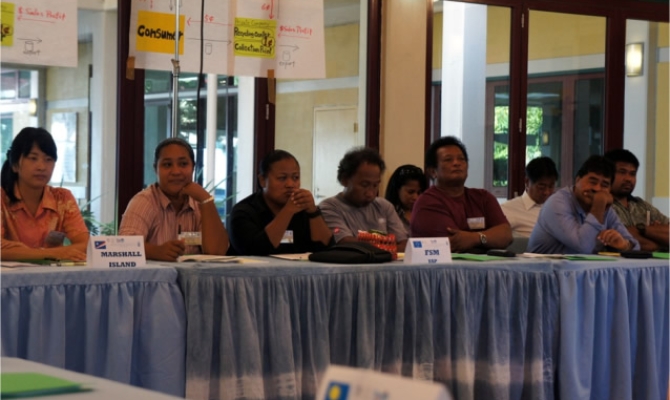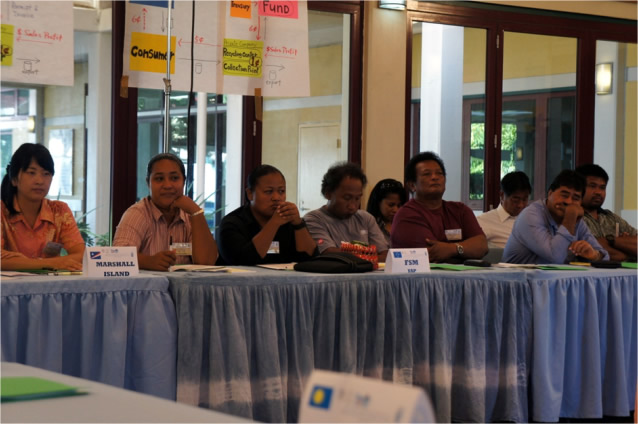
Waste Management and Pollution Control
Sharing experiences on the 3Rs (Reduce, Reuse and Recycle) in Pacific Island Countries, with an emphasis on implementing and operating container deposit programmes and organic waste composting programmes, is the emphasis of a 4-day workshop, which commenced on Monday 4th November 2013 at the Koror State Assembly Hall in Palau.

The workshop, which is co-organised by the Bureau of Public Works, the Ministry of Public Infrastructure, Industries and Commerce (MPIIC), the Koror State Government, and the J-PRISM Project being implemented by the Japan International Cooperation Agency (JICA) in collaboration with the Secretariat of the Pacific Regional Environment Programme (SPREP), brings together over 19 participants from the Federated States of Micronesia (FSM), Republic of the Marshall Islands (RMI), Palau and Samoa to exchange ideas and information on container deposit programmes and various composting methods.
Welcome remarks were provided by the Minister of Public Infrastructure, Industries and Commerce, Hon. Charles I. Obichang and the Resident Representative for JICA Palau Office, Mr. Nobuaki Matsui.
"While the Palau Beverage Container Deposit Fee Programme has been successful in helping Palau to better manage beverage containers, there is more work to be done. We need to think outside the box in order to find sustainable solutions to solid waste management in Palau," said Mr Obichang.
A container deposit programme involves charging a unit deposit or fee on specific Imported items (most commonly plastic and metal beverage containers), which is partially refunded when the used item is returned to approved depots. The un-refunded portion of the deposit is retained to manage the programme and to subsidise the exportation of the materials for recycling. This system provides an incentive to encourage the return of waste goods for recycling and reduces the amount of waste going to landfills and dumpsites.
"Recycling waste is a very important component of sustainable solid waste management, but this is not feasible on small islands such as Palau, FSM, and RMI. Therefore, returning waste for recycling is the next best option and container deposit programmes allow small island states to return some of the waste to larger countries to be recycled" said Mr. Matsui.
For the Samoan participants who are considering the benefits of introducing a container deposit programme in Samoa, the workshop is an opportunity to examine the good practices and the lessons learnt from the other countries in designing, implementing and operating container deposit programmes.
The workshop also includes sessions on organic waste composting, and awareness-raising. By the close of the workshop on Thursday, the participants will have prepared action plans to improve or implement (in the case of Samoa) the container deposit programmes in their respective countries.
J-PRISM is a 5-year Japanese Technical Cooperation Project for the Promotion of Regional Initiative on Solid Waste Management in Pacific Island Countries, which is implemented by JICA in collaboration with SPREP.
For more information, contact [email protected] or [email protected].

The workshop, which is co-organised by the Bureau of Public Works, the Ministry of Public Infrastructure, Industries and Commerce (MPIIC), the Koror State Government, and the J-PRISM Project being implemented by the Japan International Cooperation Agency (JICA) in collaboration with the Secretariat of the Pacific Regional Environment Programme (SPREP), brings together over 19 participants from the Federated States of Micronesia (FSM), Republic of the Marshall Islands (RMI), Palau and Samoa to exchange ideas and information on container deposit programmes and various composting methods.
Welcome remarks were provided by the Minister of Public Infrastructure, Industries and Commerce, Hon. Charles I. Obichang and the Resident Representative for JICA Palau Office, Mr. Nobuaki Matsui.
"While the Palau Beverage Container Deposit Fee Programme has been successful in helping Palau to better manage beverage containers, there is more work to be done. We need to think outside the box in order to find sustainable solutions to solid waste management in Palau," said Mr Obichang.
A container deposit programme involves charging a unit deposit or fee on specific Imported items (most commonly plastic and metal beverage containers), which is partially refunded when the used item is returned to approved depots. The un-refunded portion of the deposit is retained to manage the programme and to subsidise the exportation of the materials for recycling. This system provides an incentive to encourage the return of waste goods for recycling and reduces the amount of waste going to landfills and dumpsites.
"Recycling waste is a very important component of sustainable solid waste management, but this is not feasible on small islands such as Palau, FSM, and RMI. Therefore, returning waste for recycling is the next best option and container deposit programmes allow small island states to return some of the waste to larger countries to be recycled" said Mr. Matsui.
For the Samoan participants who are considering the benefits of introducing a container deposit programme in Samoa, the workshop is an opportunity to examine the good practices and the lessons learnt from the other countries in designing, implementing and operating container deposit programmes.
The workshop also includes sessions on organic waste composting, and awareness-raising. By the close of the workshop on Thursday, the participants will have prepared action plans to improve or implement (in the case of Samoa) the container deposit programmes in their respective countries.
J-PRISM is a 5-year Japanese Technical Cooperation Project for the Promotion of Regional Initiative on Solid Waste Management in Pacific Island Countries, which is implemented by JICA in collaboration with SPREP.
For more information, contact [email protected] or [email protected].